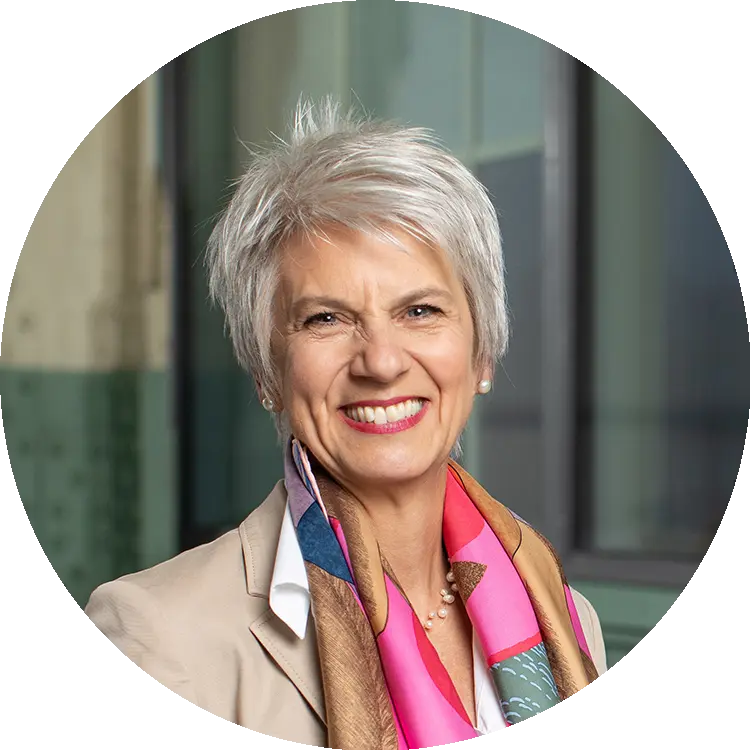Editorials Annual Report 2024
Rethinking growth

Universities of applied sciences are undeniably successful: the number of students is growing throughout the canton of Zurich, as is the number of buildings. We no longer speak of a campus but have been using the plural form instead for quite some time. The Europaallee and Toni-Areal campuses in the city of Zurich, along with the ones in Winterthur and Wädenswil, are clear signs of the success of the Zurich University of Teacher Education (PHZH), the ZHAW and the Zurich University of the Arts (ZHdK). Over the past decades, the canton has made significant investments – in lecture halls, laboratories and libraries.
To outsiders, this growth may sometimes appear uncoordinated. But that is not the case. There is a master plan, and it goes by the somewhat bureaucratic German name “Teilportfoliostrategie”, or sub-portfolio strategy. This strategy outlines the overarching and comprehensive development of the PHZH, the ZHAW and the ZHdK across the three locations Winterthur, Wädenswil and Zurich. It helps to secure spaces in the long term and set the right priorities.
We have reached a point where we must reassess and reprioritise elements of this strategy, not least due to the canton’s current financial situation. In addition to quantitative growth, there is an increasing need for growth in quality and for solutions that make the best possible use of the available resources. Ideas that allow academic programmes and learning processes to become more independent of physical spaces can provide a valuable contribution here.
The question is no longer primarily “how much”, but rather “in what form” the canton’s universities of applied sciences should grow. After all, the way in which we manage our resources is just as important as the number of resources themselves. The goal is to use them effectively and efficiently to ensure not only that the PHZH, the ZHAW and the ZHdK stay connected to society and the professional world in their research and teaching, but also to allow them to keep building meaningful bridges between vocational education, businesses and academia.
I will continue to advocate for education with deep a commitment. It is important to emphasise that investments in education benefit everyone – especially the economy. Attractive infrastructure is a key factor in combatting the shortage of skilled workers and increasing the number of graduates in the relevant fields.
It is also important that the universities themselves are able to decide how they would like to grow. This requires well-thought-out strategies to prepare for the future. If we rethink growth, universities of applied sciences will be able to continue their success story despite the challenging conditions.
The annual financial statements of the PHZH, the ZHAW and the ZHdK were reviewed for the first time by the newly established finance and risk committee. The Zurich University of Applied Sciences Council recommends that the cantonal government approve the annual reports.
Dr Silvia Steiner, Government Councillor and President of the Zurich University of Applied Sciences Council
Forward-looking research for a world in flux
In 2024, few topics shaped the public debate as much as the rapid development of artificial intelligence (AI). Universities play a pivotal role here – not only by advancing new technologies and unlocking their potential but also by critically examining their limitations. In Switzerland, the ZHAW has established itself as a key player in the field of AI. The Centre for Artificial Intelligence at the ZHAW School of Engineering is involved in numerous national and international research projects and has already produced a number of spin-offs. With the Competence Center for Generative AI, the ZHAW has created a cross-School platform, on which experts from various fields are exploring the application of AI in research and teaching, while also providing advisory services. The university is a member of the Swiss AI Initiative and, together with ETH Zurich and the University of Zurich, organised the Swiss AI conference AI+X Summit in October 2024 – an important gathering for the industry. In addition, the ZHAW is part of the international network CLAIRE (Confederation of Laboratories for Artificial Intelligence Research in Europe) and leads its Swiss branch.
Current research projects at the ZHAW span a wide range of topics. They range from faster cancer diagnoses through greater automation to biodiversity monitoring using a deep learning model trained with grasshopper sounds, and the optimisation of olive oil storage conditions through machine learning. However, the ZHAW is also tackling the broader implications of AI. In 2024, for instance, two researchers from the ZHAW School of Management and Law received funding from the Digitalization Initiative of the Zurich Higher Education Institutions (DIZH) to develop educational materials aimed at strengthening young people’s ability to protect themselves in times of AI.
Another key focus at the ZHAW is sustainable development. In the World Wildlife Fund’s sustainability ranking of Swiss higher educations, published in September 2024, the ZHAW’s progress since 2021 was commended – particularly its wide-ranging research activities, strategic leadership and the strong commitment of its staff. Through its pivotal research work, the ZHAW contributes to the energy transition, for example in areas such as the decarbonisation and electrification of industrial processes and heating technologies. In addition to its own projects, many ZHAW institutes are actively involved in renowned research consortia, such as those under the SWEET (SWiss Energy research for the Energy Transition) programme commissioned by the Swiss Federal Office of Energy (SFOE). Through its Sustainable Impact Program, the ZHAW also supports initiatives by students and staff aimed at making university operations more sustainable. One such initiative led to the creation of a training and knowledge platform that familiarises banking and finance students with the topic of sustainable investing.
The year 2024 marked Jean-Marc Piveteau’s final year as President of the ZHAW. We extend our sincere gratitude for his outstanding dedication and exceptional contributions over the past 13 years. During this period, the ZHAW has evolved into one of Switzerland’s leading universities of applied sciences, with a strong European presence. We wish him all the best for his future. At the same time, we warmly welcome Regula Jöhl as the new President and look forward to working with her.
The members of the Zurich University of Applied Sciences Council on the newly established finance and risk committee have reviewed the 2024 annual financial statements on behalf of the council.
Dr. Michael Alkalay, member of the Zurich University of Applied Sciences Council, ZHAW consultant
Prof. Dr. Thomas Gächter, member of the Zurich University of Applied Sciences Council, ZHAW consultant
Dr. Matthias Kaiserswerth, member of the Zurich University of Applied Sciences Council, ZHAW consultant
Ulrich Jakob Looser, member of the Zurich University of Applied Sciences Council, ZHAW consultant
Finding solutions to the complex questions of our time

The ZHAW can look back on a very successful year. As one of the leading universities of applied sciences in Switzerland, the ZHAW not only benefits from strong networks, but, driven by its spirit of innovation, also plays a key role in shaping the future of our country. In 2024, our university continued to nurture its excellent international relationships. These achievements are most notably the merit of my predecessor, Jean-Marc Piveteau, who retired at the end of January 2025. I would like to express my gratitude to him for his great dedication and vision in establishing the ZHAW’s strong role in addressing topics relevant to society.
During the 2024 reporting period, our university expanded its collaboration with the European university alliance EELISA (European Engineering Learning Innovation and Science Alliance). In addition, for the fourth time in a row, the ZHAW was once again chosen as Leading House South Asia and Iran. Acting in this role on behalf of the State Secretariat for Education, Research and Innovation (SERI), the ZHAW promotes and fosters scientific cooperations with key institutions across South Asia and Iran. Such international networks enable our university to transfer knowledge and technology while benefiting from exciting opportunities for study and research stays. I firmly believe that gaining valuable insights into other universities and cultures and collaborating with international teams is vital for our students to be prepared for the international labour market.
In order for our university to stay successful in the long term, it needs to constantly adapt to new challenges. The fact that some of our Schools recently celebrated key anniversaries demonstrates that the ZHAW is fully capable of mastering this task. Following the celebration of the 100th anniversary of the ZHAW School of Applied Psychology in 2023, the ZHAW School of Engineering marked its 150th anniversary in 2024. To maintain its leading position in research and in training future professionals, the ZHAW requires state-of-the-art infrastructure and facilities. In autumn 2024, the groundbreaking ceremony for two new buildings at the Technikumstrasse campus took place in Winterthur. In Wädenswil, a former industrial building will make way for the new university library and new lab facilities.
However, growth in merely quantitative terms is not our objective. Instead, our focus lies on achieving growth at the intersections of interdisciplinary collaboration. Major challenges of the present and future, such as climate change and social integration, cannot be solved by one subject area alone. Tackling these challenges will take the collaborative effort of multiple disciplines, and this is how we will continue to share our expertise. As a university of applied sciences with a multidisciplinary approach, the ZHAW has the knowledge and skills to find solutions to the complex questions of our society through interdisciplinary collaboration.
It is therefore my great pleasure to take on the leadership of the ZHAW during these exciting times. In line with the new university strategy, which came into effect at the beginning of 2025, I am also delighted to focus more clearly on entrepreneurial thinking – an approach that will benefit our students and promote innovative solutions and good cooperation with other research institutions and the business sector.
Prof. Dr. Regula Jöhl, ZHAW President